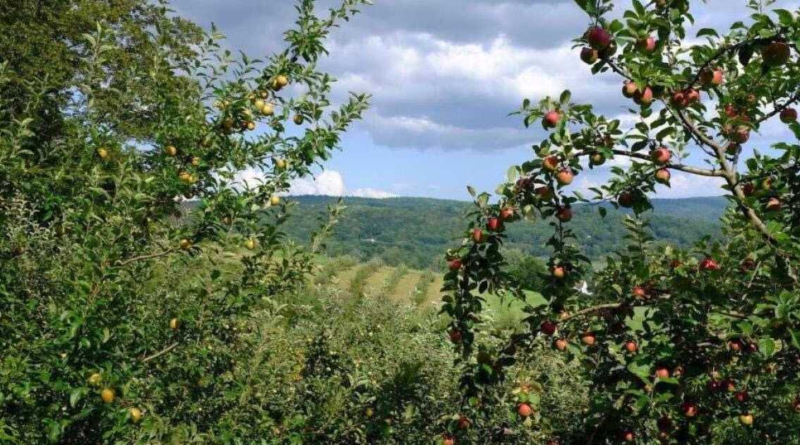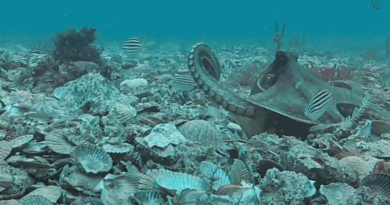Out There: A weird apple season – Vermont Public
This is the web version of our email newsletter, Out There! Sign up to get our weekly dose of all things environment — from creatures you might encounter on your next stroll, to a critical look at the state’s energy transition, plus ways to take part in community science and a roundup of local outdoor events.
It’s Thursday, September 7. Here’s what’s on deck:
But first,
Enter your email to sign up for Out There
Vermont Public’s biweekly dose of all things environment.
Loading…
The beginning of the growing season in Vermont was looking like a banner year for apples. There was a prolific bloom. Trees were covered with tiny fruit.
Then, a deep freeze at the end of May plunged much of the state below 28 degrees for hours — low enough to kill most of the apple blossoms and young fruit.
🌡 How deadly are heat waves? In New England, it’s hard to tell. States track “heat-caused” deaths, of which there are a handful across the region each year. But not “heat-related” deaths – where overheating might have contributed to a fatal complication, like a heart attack or organ failure. A couple ways to better keep track of how many people die from the heat: look at “excess deaths” during heat waves (like NYC does), or count the number of death certificates where heat is listed as a contributing factor (that’s the practice in parts of Arizona). The data can help public health workers figure out who’s at risk and what interventions are actually making a difference.
🐖 Pig problem: A few weeks ago, a woman in Tunbridge with several pigs spotted an extra swine in her yard that didn’t belong there. It looked like a wild boar, which are native to Asia and Europe. She took a photo and reported the creature to the U.S. Department of Agriculture. Ten days later, the agency found the rogue pig and killed it. While there are millions of wild pigs in the United States, Vermont doesn’t have a breeding population. And the state is trying to keep it that way — the animals spread disease and wreak havoc on the environment. The USDA last removed a wild pig from Vermont in Lyndonville in 2019. That animal likely escaped from a game preserve in New Hampshire.
🍏 Growing southern varieties: With climate change bringing more warm days to New England (10 more a year than just a few decades ago), some farmers are experimenting with crops that have historically thrived in the South. For example, some southern apple varieties ripen later – that’s good for New England apple growers since our season is creeping later into the fall. Other species are more pest-resistant, which is also important as farmers see more bugs and diseases from southern climes.
🔌 11% of household income: That’s how much the average Vermonter spends on energy costs, including heating, driving and just keeping the lights on. Some of the towns with the highest relative costs are in rural parts of the state, especially the Northeast Kingdom, where energy bills account for over 15% of people’s income, on average. That’s according to areport from Efficiency Vermont. People in those areas have to drive farther, and transportation accounts for a large share of Vermonters’ energy costs.
🚲 Three wheels, no problem: A new seven-mile network of mountain bike trails in Bolton is officially open. The wide trails have berms with flat corners and drops designed for three-wheeled adaptive bikes. Richmond Mountain Trails says they’re planning to build two final downhill sections next year.
🎽 Try a biathlon: In this case, it’s a run or mountain bike race plus shooting competition, open to athletes new to the sport. You’ll learn everything you need to compete at aclinic at the Craftsbury Outdoor Centeron Saturday, Sept. 9. $25 for adults, $15 for kids under 14, rifles provided. Register by 8 p.m. today (Sept. 7) to reserve your spot.
🪓 Tour a managed woodland: A town historian, landowner and forester in Sharon will lead a tour of a patch of actively managed forest starting at 10 a.m. on Saturday, Sept. 16. They’ll review the history of the land, discuss how timber harvests can help wildlife and share plans for the land to become part of a new carbon offset program.
🥌 Competitive stone skipping: Hundreds of people are expected to attend the 10th Annual Stone Skipping Festival at Bennington’s Lake Paran. You can watch the professionals compete, or work on your own skipping skills yourself. Kids competitions start at 1 p.m. on Saturday, Sept. 16, followed by amateurs and then the pros.
🎥 Not your typical ski movie: There’s a 300-mile cross-country ski trail that runs the length of Vermont. A skier traversed the whole thing, then made a film about the journey and how human-caused climate change has altered winter in Vermont. Watch a free screening of 300 Miles Melting in Burlington at 6 p.m. on Saturday, Sept. 16, followed by a discussion with climate experts, public land activists and the Vermont Huts Association. First come, first served.
🌠 Stargazing with friends: The Vermont Astronomical Society is holding apublic stargazing event at the Rokeby Museum in Ferrisburgh, starting at 8:30 p.m. on Saturday, Sept. 16. They’ll probably be in a field behind the museum with telescopes set up, but check their website for an update before the event.
Seven years ago, Susan Sawyer drew a bee she had taken a photo of in her yard in Washington County. That eventually led to the discovery of a species that had never been recorded in Vermont: the indiscriminate cuckoo bumblebee. The bees are parasitic; they out-compete other bumblebees by taking over their nests to lay their own eggs. Females have a long, hard abdomen, so they don’t get stung in the process. The species hasn’t been seen in Vermont since Sawyer’s first spotting.
Enter your email to sign up for Out There
Vermont Public’s biweekly dose of all things environment.
Loading…
Thanks for reading! If you have ideas for events we should feature, critters, fungi or plants you want to learn more about, or other feedback, we’d love to hear from you! Just email us.
Credits: This week’s edition was put together by Lexi Krupp, Sophie Stephens, Joia Putnoi and Brittany Patterson with lots of help from the Vermont Public team, including graphics by Laura Nakasaka.
Enter your email to sign up for The Frequency
Vermont Public’s daily news update, sent weekday mornings.
Loading…
See more subscription options
Enter your email to sign up for Vermont Public’s biweekly dose of all things environment:
Loading…



